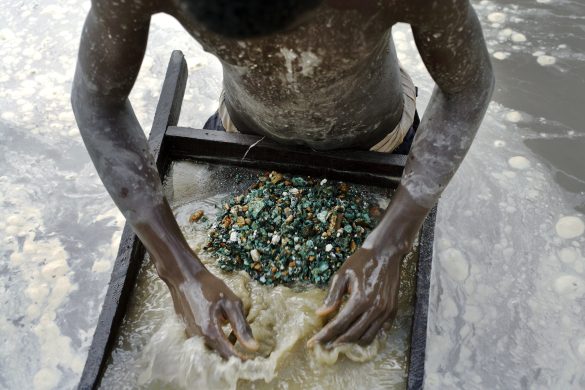KALONGE, 21 August, 2017 (MSF): Three-year-old Rachel sways gently on her mother’s lap and stares blankly at the women trickling into a health center in Kalonge, South Kivu, Democratic Republic of Congo (DRC). Rachel is suffering from malnutrition, and, with wrinkled skin and sagging eyes, is much too small for her age.
Malnutrition is widespread in the DRC, with approximately two million severely wasted children in the country, according to UNICEF. Places like South Kivu—emerging from decades of warfare, but not yet peaceful—are particularly affected, as many of the humanitarian agencies that had kept the crisis in check have retreated in recent years.
Doctors Without Borders/Médecins Sans Frontières (MSF) teams discovered an astonishing number of severely undernourished children there during a massive measles vaccination campaign. “The situation far exceeded international emergency thresholds, with severe acute malnutrition rates of three percent in many localities,” says Francisco Otero y Villar, MSF’s Head of Mission in South Kivu. “Large scale internal displacement in the region, an on-going, lean agricultural season, and limited presence of aid actors forced MSF to intervene to control this silently unfolding emergency.”
Rachel has come to the MSF nutrition center with her mother, Alphonsine, to collect her weekly ration of ready-to-eat therapeutic food for children suffering from severe acute malnutrition. Alphonsine sits quietly alongside 20 other parents in a tent at the center where health staff monitor the progress of children receiving treatment. Set amid the green, rolling hills of the forests of South Kivu, the nutrition center stands out.
Chronic violence
Full-scale conflict may have subsided in South Kivu in recent years, but armed groups—remnants of the Congo Wars of the late 1990s—continue to be a source of instability in the region. During the frequent clashes between these factions and the national army, entire families are forced to flee to neighboring villages to seek shelter with anyone willing to accept them. If displaced people can’t find a place to stay, they can spend days in the forests, returning home when the conflict dies down. Frequent displacement severely affects residents’ ability to grow crops or participate in stable commerce.
Sporadic clashes between armed groups have forced Alphonsine and her family to flee their home at least eight times, most recently the night before she arrived at the nutrition center with Rachel. As rumors spread that an armed group was planning an attack on the army camp in their village, the family ran toward the forest, where they spent the night sleeping under the open sky with four other families from the village. In the morning, Alphonsine hiked to the health center with Rachel on her back, a trip that took over two hours.
After collecting her ration of therapeutic food, Alphonsine intends to go to the hospital in her village, where her son had been admitted for malaria treatment. Once there, she will assess whether the village is safe enough for the rest of her family to return.
Food insecurity
Several other factors drive food insecurity in the region. Most people do not own land and must work for others, earning barely a dollar a day when they’re able to find work at all. Occasionally, displaced families trade labor for access to food and services.
Health care is not free in DRC and a single consultation can exhaust a day’s earnings for most families. “Since my child is in hospital, I am obliged to work in the fields of the hospital warden in order to pay the cost of the treatment,” says Alphonsine. The country is one of the poorest in the world, and with outbursts of violence impeding movement, accessing health care can be extremely challenging.
A few essential health services are offered free of charge, however, including nutrition treatment. But staff at several health centers in Kalonge say that, other than what they receive from MSF, they are rarely able to acquire supplements to treat severe acute malnutrition. While they can diagnose it, they have little to offer in terms of treatment.
Adding to the difficulties, the region is also dealing with a below average rainfall and an infestation of armyworms that is ravaging most of southern Africa. Many locals also say that agricultural production has declined over the past ten years. “The soil is exhausted,” laments one farmer in the region. “And we can’t afford fertilizer.”
MSF’s response and withdrawal
For years, humanitarian agencies working on food security and health care provided a safety net for displaced people. Recently, however, MSF and other groups have reduced operations in the region. For MSF—which supported several health structures in South Kivu for over eight years—the decision to leave is driven by the need to focus limited resources on areas severely affected by violence and insecurity. As the situation in Kalonge has become more stable, MSF has gradually reduced operations while continuing to provide therapeutic food to health centers to treat children with severe acute malnutrition. Since MSF has been in the region, 879 children have recovered from severe malnutrition and a further 243 are undergoing treatment.
For MSF, the decision to leave is difficult, but needs in a country like the DRC are so enormous that the organization is forced to direct its limited resources towards activities that can save the maximum number of lives. Alphonsine, meanwhile, echoes the disappointment of many others at MSF’s decision to withdraw. “I will once again retreat into my despair,” she says. “I will do what I can for my children. But I am not happy that MSF is leaving and I don’t know who else I can go to.”
After intervening to save those most at risk, MSF is now calling on other groups to step in. “The nutrition crisis in Kalonge is chronic and requires a comprehensive response,” says Francesco Otero y Villar. “In the short term, health centers should quickly start receiving regular supplements that allow them to treat severe and moderate cases of malnutrition, either from the Ministry of Health or from other partners and donors. Equally, longer-term solutions to improve food security are urgently needed, requiring greater involvement from development organizations.”
The clock is ticking for food security and development agencies to address the situation, and to break the cycle of malnutrition crises and emergency responses.















